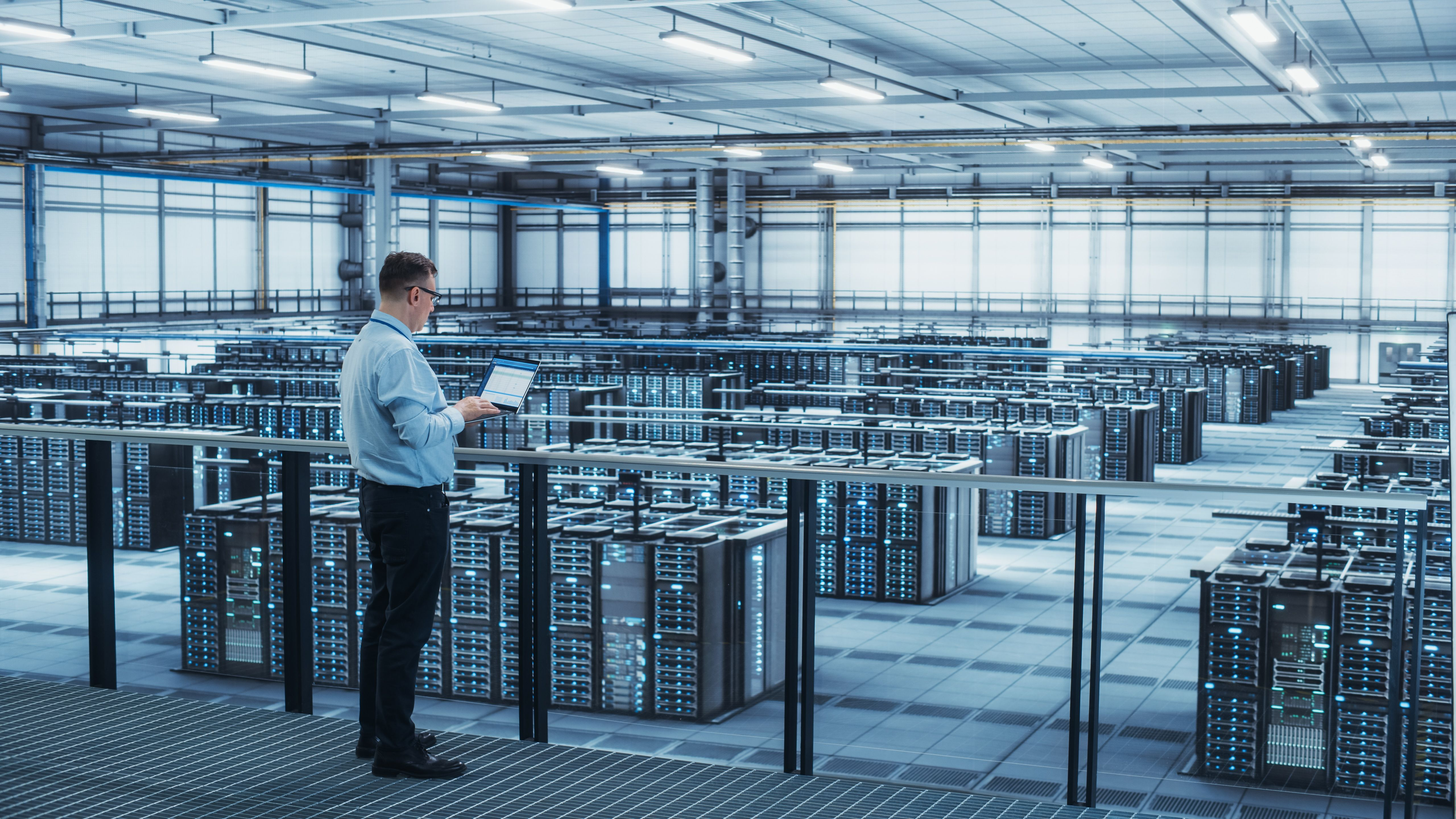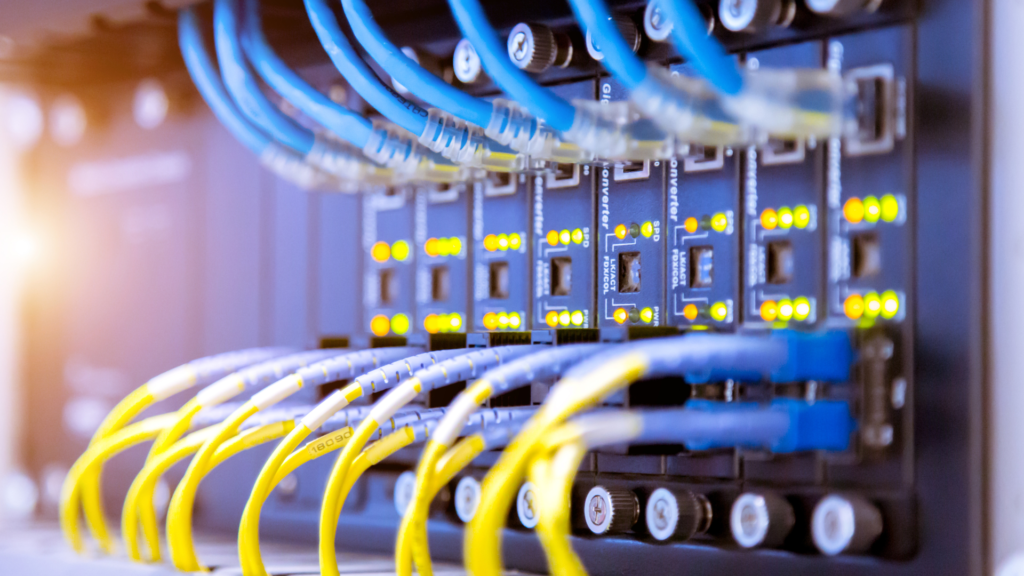
Table of Contents
The Benefits of Colocation for Modern Businesses
Allied Market Research estimates the global colocation market to grow from $46.06 billion to $207.21 between 2020 and 2030. From cost savings and improved reliability to enhanced scalability and security, the benefits of colocation are fueling growth in data center demand.
In this blog post, we will explore the numerous benefits of colocation data centers that can transform your business operations and set you on the path to success. How can colocation help upscale your business operations? Continue reading to find out!
What is Colocation?
Colocation (popularly called colo) is a service offered by data centers that allows businesses to rent space for their servers and other networking equipment. Instead of building and maintaining their own data centers, companies can use colocation centers’ state-of-the-art facilities and infrastructure.
With a colocation service, businesses lease space within a data center, typically in the form of racks, cabinets, or cages. The data center provides the necessary power, cooling, and physical security for the equipment. They also provide redundant network connections to ensure reliable access to the internet and high availability for business critical applications. Colocation providers also offer technical support and maintenance services to keep the infrastructure running smoothly.
Colocation services offers a range of benefits, including cost savings, uptime, redundancy, and scalability.

What Are the Benefits of a Colocation Data Center?
The main benefits of a colocation data center can be grouped into the following categories:
- Space
- Power and cooling
- Network connectivity
- Physical security
- Professional and managed services
Let’s explore each in greater detail.
Space
Colocation space is rented to businesses in various configurations. This allows companies to select the most appropriate option based on their current needs and growth plans. The primary space options in colocation facilities include partial racks, full racks, private cages, and private colocation suites. Each of these options caters to different levels of infrastructure and security needs.
Partial Rack
A partial rack, also known as a shared rack, is an option for many businesses, that require only a small amount of colo space. Companies lease a portion of a rack, typically measured in “rack units” (U), where one rack unit equals 1.75 inches in height. Partial racks are ideal for smaller businesses or startups with limited hardware requirements. A partial rack is also the most cost-effective data center solution, and can start as small as a single server (1RU). Other popular size options are 2RU, 4RU, 10RU (quarter rack), and 20RU (half-rack or half-cabinet).
Full Rack
A full rack is a dedicated rack reserved for a single client. These racks usually offer 42U of space, providing ample room for numerous servers and networking devices. Full racks are suitable for businesses with more substantial hardware requirements. They are also a fit for those looking to maintain separation from other clients within the colocation facility. This option offers increased privacy and additional space for future growth.
Private Cage
A private cage is a secured, enclosed space within the colocation facility dedicated to a single client. This option provides an added layer of security and privacy compared to full racks, as it physically separates the client’s equipment from others in the data center. Private cages are customizable, allowing businesses to design the layout and choose the space size based on their needs. This option is ideal for larger enterprises or organizations with strict security requirements.
Private Colocation Suite
A private colocation suite is a fully enclosed, dedicated space within the colocation facility. This offers the highest level of privacy and security. These suites often come with power, cooling, and security systems, providing clients with complete control over their environment. Private suites cater to businesses with significant infrastructure requirements. They are also a fit for businesses with stringent security and compliance needs, such as financial institutions or healthcare organizations.
By selecting the appropriate space option, businesses can optimize their infrastructure management, control costs, and focus on their core operations through data center colocation.

Power and Cooling
Power and cooling are two critical components of a colocation facility’s infrastructure. They provide several benefits for businesses housing their IT equipment in these data centers. By leveraging a colocation facility’s advanced power and cooling systems, businesses can ensure optimal performance, reliability, and cost-efficiency for their infrastructure.
Here are a few key power and cooling benefits of colocation:
Energy Efficiency
Colocation facilities are designed with energy-efficient power and cooling systems in mind. These systems often employ advanced technologies such as high-efficiency UPS (Uninterruptible Power Supply) battery backup systems, economization, and aisle containment. These can significantly reduce energy consumption. Through colocation, businesses can benefit from these energy-efficient practices, leading to lower operating and construction costs, and a reduced carbon footprint.
Reliability
A reliable power supply is essential for the smooth operation of IT equipment. Colocation facilities are equipped with redundant power supply systems, including backup generators and UPS systems, which ensure continuous power availability during a power outage or other disruptions. Colo facilities regulary connect to multiple power grids improving business continuity.
Additionally, cooling systems in these facilities are designed to maintain optimal temperature and humidity levels, preventing overheating and prolonging the lifespan of your IT equipment.
Scalability
As your business grows, so do your power and cooling requirements. Colocation services offer scalable power and cooling solutions that can be adjusted to accommodate your changing needs. This flexibility allows you to scale your infrastructure efficiently without the risk of overloading your power or cooling capacity.
Cost Savings
Building and maintaining your own servers and in-house data center can be a significant financial burden. By colocating in a facility with these advanced systems, businesses can save on the capital expenditure required for setting up and managing their own infrastructure.
Monitoring and Management
Colocation facilities typically offer monitoring and management services for their power and cooling systems. This ensures that any issues or potential risks are promptly identified and addressed, minimizing the risk of downtime or equipment damage. By leveraging the expertise of the colocation provider, businesses can rest assured that their IT equipment is functioning optimally and securely.
By colocating in a facility with advanced power and cooling infrastructure, companies can ensure their IT equipment’s optimal performance and longevity.
Network Connectivity
Network connectivity is vital to colocation facilities, enabling businesses to access and transmit data efficiently and reliably. By colocating in a facility with robust network connectivity, businesses can benefit from better connectivity, enhanced performance and many networking options. Here are some key advantages of the network connectivity offered by colocation facilities:
Diverse Connectivity Options
Colocation facilities typically provide various network services, including access to multiple internet service providers, Internet Exchange Points (IXPs), and cloud service providers. This diversity allows businesses to select the most suitable connectivity solution based on their specific requirements, such as latency, bandwidth, and redundancy.
Improved Network Performance
The extensive network infrastructure of colocation facilities often enables businesses to establish direct connections with their chosen carriers, IXPs, or cloud service providers. These direct connections can significantly reduce latency and increase data transfer speeds, improving network performance and a better user experience.
Redundancy and Resilience
Colocation facilities are designed with network redundancy. This ensures that businesses can maintain access to their data and services even during a network failure. Fully redundant network connections, diverse routing, and backup systems contribute to the overall resilience of the colocation facility’s network infrastructure, minimizing the risk of downtime and associated costs.
Scalability
As your business grows and your network requirements evolve, colocation facilities can offer the flexibility to scale your network. Whether you need to increase bandwidth, establish new connections, or expand to new locations, colocation providers can accommodate these changes efficiently and cost-effectively.

Security
Physical security is a crucial aspect of colocation facilities. It ensures the safety and integrity of the housed IT equipment. By colocating in a facility with robust security measures, businesses can benefit from the peace of mind that their valuable data and infrastructure are well-protected. Here are some key benefits of the physical security offered by colocation facilities:
Access Control
Colocation facilities typically employ stringent access control measures. These include biometric scanners, keycard systems, and security checkpoints, to restrict unauthorized entry. These measures ensure that only authorized personnel can access the premises, significantly reducing the risk of theft, vandalism, or other malicious activities.
Surveillance
State-of-the-art video surveillance systems are a standard feature in colocation facilities. Security cameras monitor the premises around the clock, capturing any suspicious activity and providing an added layer of protection. Surveillance systems also serve as a deterrent, discouraging potential wrongdoers from attempting to access the facility.
On-Site Security Personnel
Many colocation facilities have on-site security personnel who regularly patrol and monitor the premises 24/7. Their presence is a visible deterrent to potential intruders and ensures rapid response in case of any serious security issues, breaches or other incidents.
Layered Security
Colocation facilities often implement a multi-layered security approach, combining access control, surveillance, on-site personnel, and other measures to create a comprehensive security system. This layered approach increases the overall effectiveness of security measures, providing businesses with greater assurance that their IT assets are secure.
Compliance
Maintaining compliance with security standards is essential for businesses operating in highly regulated industries, such as finance or healthcare. Colocation facilities adhere to industry-specific security guidelines and certifications, such as SSAE 18, PCI DSS, and HIPAA. By colocating in a facility that meets these standards, businesses can demonstrate their commitment to maintaining the highest levels of security and compliance.
By colocating in a facility with robust security measures, companies can ensure the safety and integrity of their IT equipment, allowing them to focus on their core operations and maintain a competitive edge in the digital landscape.
Professional and Managed Services
Colocation facilities provide professional and managed services, allowing businesses to efficiently manage and maintain their IT equipment without the need for constant on-site presence. These services enable companies to focus on their core operations while benefiting from the expertise and resources of the colocation provider.
Here are some key advantages of remote hands and managed services in a colocation facility:
Technical Expertise
Colocation facilities employ a team of skilled technicians who are well-versed in various aspects of IT infrastructure management. These services are often referred to as “remote hands” in colocation lingo. These remote hands services include performing hardware installation, troubleshooting, and maintenance on behalf of the businesses colocating their equipment. This allows companies to benefit from the technical expertise of the colocation provider without the need for dedicated in-house staff.
Reduced Downtime
Remote hands services can help minimize downtime by providing prompt assistance in case of hardware or network issues. Technicians at the colocation facility can quickly diagnose and resolve problems, ensuring that your IT equipment remains operational and reducing the potential for lost revenue or productivity.
Cost Savings
Utilizing remote hands and managed services can lead to significant cost savings for businesses. Companies can avoid the expense of hiring and training in-house IT staff or sending personnel to the colocation facility for routine maintenance tasks. Additionally, managed services often include proactive monitoring and maintenance, which can help prevent issues before they escalate and result in costly downtime.
Flexibility and Convenience
Remote hands and managed services allow businesses to request assistance without the constraints of maintaining a full-time, on-site IT team. This convenience particularly benefits companies with limited resources or with staff located far from the colocation facility.
Comprehensive Support
In addition to remote hands services, colocation providers often offer a range of managed services, such as network management, data backup and recovery, data security, business continuity, and cloud solutions. These comprehensive support offerings enable businesses to outsource various aspects of their IT infrastructure management, allowing them to focus on their core operations and strategic growth initiatives.
By leveraging these services, colocation customers can efficiently manage and maintain their IT infrastructure while focusing on their core operations, driving business growth in today’s competitive digital landscape.

Brightlio Delivers Excellent Colocation Solutions!
Brightlio is a telecommunications broker and data center consultant. We partner with the best colocation providers in the country to deliver colocation solutions that meet your needs and budget.
We also offer unified communications, public cloud computing, advisory, SD-WAN, and internet connectivity solutions. Price quotes and solution designs are provided at no cost.
Contact our team to get started today!
Recent Posts
Vancouver Data Centers: Colocation in the Pacific Northwest
Business Broadband Solutions: The Ultimate Guide
Let's start
a new project together



